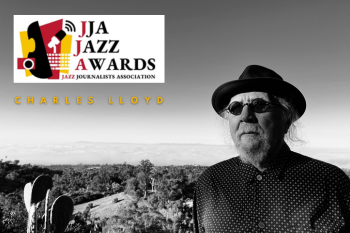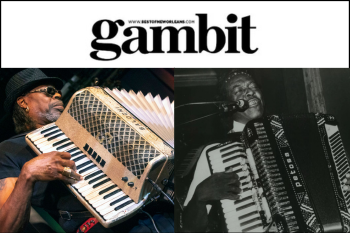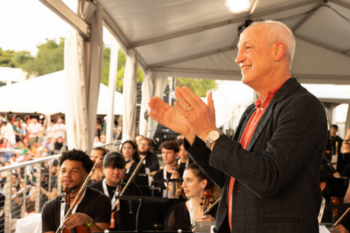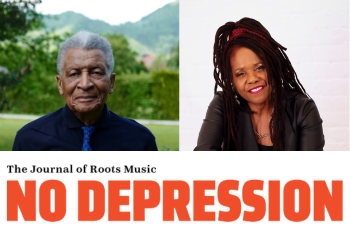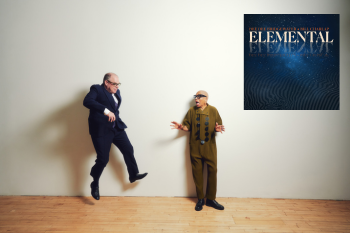
Out everywhere June 13, 2025!
Ask any true jazz fan to draw up a list of the greatest vocalists of the modern era and the name Dee Dee Bridgewater will inevitably appear at the top. Repeat the exercise for contemporary pianists and you’ll just as assuredly see Bill Charlap on the short list.
Draw a line between the two however, and the most dedicated aficionado would have no chance of predicting the outcome. The prospect of a collaboration proved daunting even to Bridgewater and Charlap themselves, who had never worked together prior to their first meeting live on stage in 2019.
“Chemistry happens or it doesn’t happen,” Charlap insists. “And when it happens, it happens – boom! – instantaneously.”
That it happened and continues to happen for this inspired pairing of GRAMMY®-winning jazz masters is reflected in the title of their debut release as a duo. Elemental hints at the profound virtually subatomic level on which these two brilliant artists connect. In a relatively short but fruitful period of time – interrupted but not derailed by the pandemic – they have forged a camaraderie that soars past the chemical to the alchemical.
“The two of us have discovered a kind of musical melding that is completely inexplicable to the untrained ear,” says Bridgewater. “We’ve become a gentle force of nature, and people are astounded when they encounter it.”
The initial idea for the collaboration was Bridgewater’s, and appropriately for a project that has taken on such a mystical aura, it arrived like a bolt out of the blue. “I hear voices,” the singer explains. “I woke one morning and a voice said, ‘Bill Charlap.’ I was really quite dumbfounded because it seemed like such an unlikely pairing for me.”
But one thing that Bridgewater has learned over the course of her remarkable, nearly six-decade career is to trust in that voice. Her broad-ranging successes speak for themselves: three GRAMMY® Awards, a Tony Award, NEA Jazz Master honors, a Doris Duke Performing Artist Award, and the 2024 Bruce Lundvall Visionary Award, just to name a few of her myriad accolades.
So she took yet another leap of faith along a path riddled by such bold ventures, and set the wheels in motion. However surprised Bridgewater may have been by the concept, Charlap was downright shocked to receive the unexpected call from the duo’s shared booking agent.
“I have always been and continue to be a huge fan of Dee Dee Bridgewater,” the pianist says. “I was delighted at the prospect of us working together, but I assumed she would be guesting with my trio. When I was told no, Dee Dee wants to do this as a duo, all of a sudden a bunch of lights went on.”
Charlap of course is no stranger to working with incredible singers. He won a GRAMMY® Award in 2016 for The Silver Lining: The Songs of Jerome Kern, his acclaimed album with one of the all-time greats, Tony Bennett. He’s also recorded with Barbra Streisand, Diana Krall, Ann Hampton Callaway, Freddy Cole, Carol Sloane, and two beloved albums with his mother, cabaret and jazz singer Sandy Stewart.
The pair scheduled a few exploratory concerts to determine whether they in fact did possess that ever-elusive chemistry. The results were more exhilarating than the two had dared hope.
“My perception and my understanding of Bill changed completely after we got together,” Bridgewater explains. “I knew that he was steeped in the American songbook, but I did not know the degree of his extreme knowledge. I was blown away by Bill’s sensitivity as a pianist, his wealth of knowledge and the references that he can call upon when he’s playing. I mean, he’s an encyclopedia. I have never before in all of my years worked with a musician with whom I could so completely relax and be myself.”
Charlap is quick to return the compliments. “Dee Dee Bridgewater is a giant of a musician,” he says. “A brilliant vocalist, but just as much an actor, just as much a storyteller, just as much a risk taker. All of that is together in equal parts, with each piece stepping out into the follow spot at different moments. That makes her unlike anybody else historically.”
As singular as both musicians are known to be as individuals their pairing is wholly unique, calling to mind nonpareil duos of the past from Ella and Louis to Billie and Prez. Witness the way that Bridgewater’s vocal brushwork at the outset of “Beginning to See the Light” evokes percussive strikes from the piano; or the gravity-defying leaps that the singer takes atop Charlap’s jaunty, percolating lines on “Honeysuckle Rose”.
Bridgewater and Charlap journey across a vast panorama of emotions throughout Elemental, managing to maintain a simultaneous sense of play and heartbreak – Bridgewater proffers the word “whimsy” to describe the fanciful spirit at the core of this music, evident whether they’re careening through a breathless “Caravan” or basking in the fragile silences of “Here’s That Rainy Day;” twirling hip filigrees around one another on “’S Wonderful” or moanin’ the lowest of the lows on “Love for Sale.”
That all of these feelings can be conjured in such a captivating spirit of spontaneity speaks to the shared experience that these two masters bring to the collaboration. “I always say, ‘The heart knows everything the head knows,’” Charlap says. “But the heart also knows things the head doesn’t know. So trust the heart. Dee Dee knows that – she’s a force of nature, always willing to jump into the deep end of the pool.”
“There’s such a joy that emanates from what we’re doing,” adds Bridgewater. “Every time we perform together is a kind of spiritual release for me. I always know that it’s going to be something special and unique and tremendous and momentous. I’m really happy that we both said yes to this adventure.”
